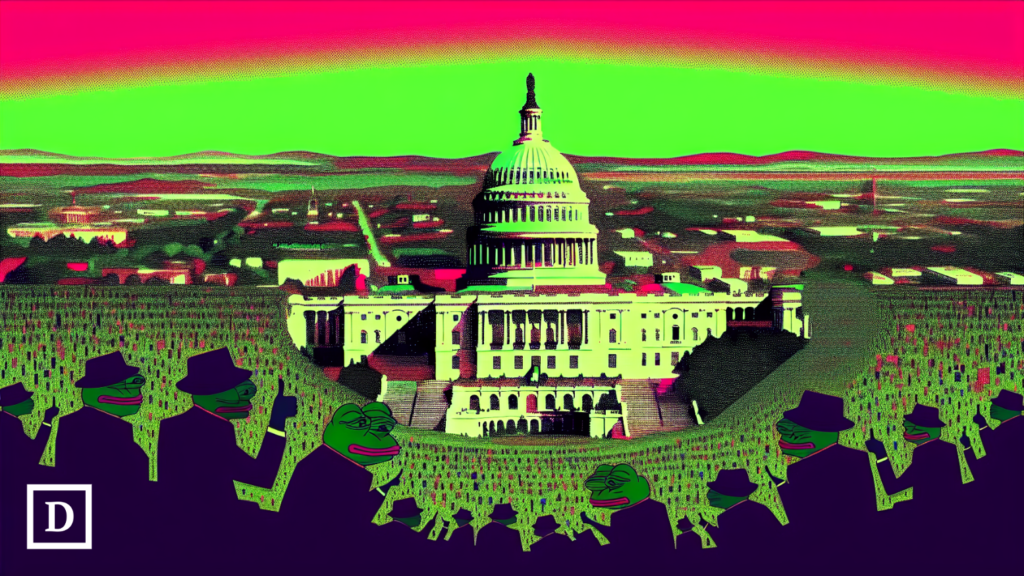
The Senate’s stablecoin legislation, the GENIUS Act, as well as the House’s crypto market structure bill, the CLARITY Act, have both advanced toward a full vote.
Both Houses of Congress have voted to move key pieces of crypto legislation forward this week.
Yesterday, June 11, the Senate again voted to invoke cloture on the Guiding and Establishing National Innovation for U.S. Stablecoins Act, known as the GENIUS Act, cutting off debate and sending the bill to a vote before the full Senate.
Earlier this week, two committees in the House passed the Digital Asset Market Clarity Act, or CLARITY Act of 2025. The House Financial Services Committee and the House Agricultural Committee each passed the bill out of committee, sending it to the full House for further action.
GENIUS Moves Ahead
Of the two, the more focused GENIUS Act is further along in the process of passing into law. The Senate’s cloture rule means the bill will undergo just 30 more hours of debate and then go for a full vote. It has bipartisan support and needed at least 60 votes for cloture, meaning it should have the 51 votes necessary for passage.
This is the third cloture vote related to the bill, and was a vote to prevent filibuster on a particular substitute amendment that includes a slew of terms and definitions, and was introduced just a few days ago.
The substitute amendment is for the updated version of the stablecoin bill, introduced by Sen. Bill Hagerty on May 1, which includes changes requested by Democrats. The Senate voted to invoke cloture on this new version of the bill on May 20.
Several Democrats, including Senate Minority Leader Chuck Schumer and Massachusetts Sen. Elizabeth Warren are still fighting to kill the bill unless provisions are added limiting President Donald Trump’s personal crypto involvement.
“This is a victory for working families, small businesses and everyday Americans who deserve faster, cheaper and safer access to financial services,” said Sen. Tim Scott (R-S.C.), chairman of the Senate Banking Committee, in a statement yesterday, continuing:
“It’s a win for innovation because this framework will give entrepreneurs the confidence to build here in the United States of America and not abroad. And it’s a win for national security because the GENIUS Act brings stablecoin issuers under strict anti-money-laundering standards.”
Gaining Clarity
Now that the House committees have voted to advance the crypto market structure bill, the CLARITY Act of 2025, the two committees’ marked up versions must be reconciled and then brought before the House for debate and amendments. In this case as well, there is bipartisan support for the bill.
Without a regulatory framework, “America will not lead and innovation will be lost,” said House Agriculture Committee Chairman Glenn Thompson (R-Pa.) in a statement before that committee’s vote on Tuesday, adding:
“Federal oversight will ensure that customers in every state are afforded the same protections and that Americans can innovate, build digital assets free from the fear of federal enforcement actions.”
Thompson’s committee oversees the Commodity Futures Trading Commission (CFTC), which is set to gain a great deal of oversight of cryptocurrency markets under the terms of the CLARITY Act.
Protecting DeFi
In another win for the industry, the latest version of the CLARITY Act would prevent non-custodial software developers, miners and validators from being forced to register as money transmitting businesses.
That would have forced them to collect know-your-customer data under the Bank Secrecy Act (BSA), which is effectively impossible, as these entities do not have access to that type of user information.
“We’re happy to see the new Blockchain Regulatory Certainty Act (BRCA) included in the newly introduced CLARITY Act,” said Jessica Martinez, Senior Director of Government Relations at the Blockchain Association in an email to The Defiant. “BRCA ensures protecting the software developers and innovators who are building our financial future.”
The Blockchain Association released a joint statement on Monday that revealed the BRCA had been included in the crypto market structure bill.
The issue first arose under the Biden Administration, which proposed a definition of money transmitting businesses that was so broad that, when applied to the crypto industry, even developers of non-custodial wallets, crypto miners and validators could have been roped in.
While the Treasury Department’s Financial Crimes Enforcement Network (FinCEN) issued guidance in 2019 stated that the BSA wouldn’t be enforced so broadly, an industry laboring under the effects of Operation Choke Point 2.0 didn’t trust the administration.
Separately, in a speech at the Securities and Exchange Commission’s (SEC) Crypto Task Force roundtable on decentralized finance (DeFi) on June 9, Chairman Paul Atkins took a strong and highly positive stance on DeFi, marking a seismic shift from the SEC under President Biden.
The SEC chair called for formal regulations on staking, establishing legal clarity on the view that “voluntary participation in a proof-of-work or proof-of-stake network as a ‘miner,’ ‘validator,’ or ‘staking-as-a-service’ provider is not within the scope of the federal securities laws.” This view on staking was put forward late last month as an informal clarification statement from the SEC’s Division of Corporation Finance.


